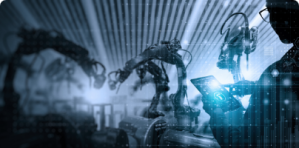Smart Factories of the Future: How IIoT Transforms Manufacturing
The word “future” evokes many different images in our brains. Maybe it’s flying cars. Or robot workers running up and down warehouse aisles. Or possibly, gleaming Jetson-esque cities that may soon become the norm. Some of these ideas are closer at hand than others, but no matter what, the future offers exciting possibilities, especially for those in the world of manufacturing. Across the globe, smart factories will soon overtake manufacturing and companies that ignore the trend could be left in the dust. Let’s take a look at how IIoT transforms the world of manufacturing as Industry 4.0 continues to dominate the landscape.
Industry 4.0 and the Current State of Manufacturing
Like many other businesses, the manufacturing industry (no matter what kind of products are produced) is currently in a state of transition. Manual processes — like handwritten documentation, local spreadsheets, and whiteboard workflow diagrams — are still commonplace for many companies. We also still frequently see IT and OT systems working separately of one another with no real method of connection or communication established between them.
Enter Industry 4.0. Industry 4.0 is the common term for the Fourth Industrial Revolution, which began in the early 2010s and marks the increased, rapid shift toward technology, interconnectivity, and automation. As manufacturers hurtle faster and faster toward tech changes within their production facilities, factories have entered a state of evolution. Some still feature the manual processes of past, some already boast the automation and tech-centric future, and most fall somewhere in the middle. As we step closer to the future each day, it’s necessary to analyze what that means and how it benefits the industry as a whole.
What is IIoT?
An essential component of any smart factory is the Industrial Internet of Things, more often referred to as IIoT or industrial IoT. IIoT is the heart of the smart factory and any manufacturer looking to fully move into the future must leverage it to their full advantage. To put it in layman’s terms, IIoT in manufacturing allows data analysis to work at its full potential. It connects a facility’s machinery, devices, and systems and allows them to communicate with one another in real time. This means that operators and stakeholders throughout a company receive a huge variety of benefits, such as:
- Improved visibility of every aspect of the production process
- Increased production control
- Full supply chain visibility
- Optimized operations
- Reduced machine and labor downtime
- Better product quality
IIoT and its connected devices are the critical first step in moving a factory into the future. These futuristic facilities will soon become the norm, making it imperative that manufacturers adopt industrial IoT as early as possible. Because of this, all businesses should understand what a smart factory is and how it will work in their favor moving forward.
What is a Smart Factory?
Smart factories are all about connections. As the future of manufacturing draws ever closer, systems and devices throughout these facilities will need to communicate with one another in real time. This means that virtually every aspect of a plant – from the OT hardware to the IT systems – are all working together. Most of the time, the information they collect goes into the cloud so that both local operators and stakeholders from around the globe can gather the information they need. This allows employees in a smart manufacturing environment to drive automated processes with the help of valuable, usable data to keep the factory running at its most efficient and most productive.
Discover IIoT's pivotal role in revolutionizing industries, contributing $14.2 trillion to the global economy by 2030.
Learn how industrial businesses can make informed decisions and future-proof their operations for a connected smart factory. Our whitepaper explores IIoT’s significance, technology, functionality, and foundational role in Industry 4.0’s smart factory vision. Gain valuable insights into the growing significance of IIoT in modern industries.
Move Fast Toward the Future
The benefits of early IIoT adoption and creating a smart factory of the future out of your facility are nearly endless. Take a look:
Better Quality: By sending production data to the cloud, machine learning models are able to see patterns and anomalies that humans would likely miss. This enhances efficiency, reduces downtime, minimizes waste, and dramatically improves product quality.
Premium Operational Agility: With access to data and analytics in real time, a smart factory can adapt and change at a moment’s notice.
Promotes Sustainability: Through constant energy management and monitoring, manufacturers are equipped to find areas of improvement — resulting in cost savings and a decreased environmental impact.
Safety and Security: Not only does industrial IoT allow systems to communicate with another in real time, but it also keeps a constant eye on the health and status of machines and equipment throughout the smart factory. Hazards are caught earlier, operators are alerted, and potential disasters are avoided.
Informed Decision Making: Providing the ability to make important, informed decisions is a critical factor in empowering any workforce. Smart factory manufacturing offers incredible insights that promote just that — informed decision making, skillset enhancements, continuous improvement, empowered innovation, and much more.
Smart Factories of the Future: Start Today
Implementing IIoT in manufacturing can seem like a daunting task, but it doesn’t need to be. In our most recent whitepaper, “Transforming Industry with IIoT: Initiating a Smart Factory – Tackling IIoT Adoption Challenges,” Process Automation Solutions takes you through every step of the process. From the foundations of Industry 4.0 to finding the best method of adoption for your business, it’s all there. Find the free download right here so you can get started creating the smart factory of the future you need.







